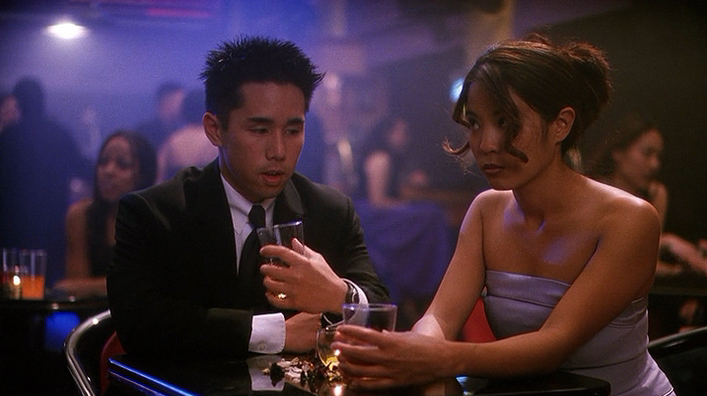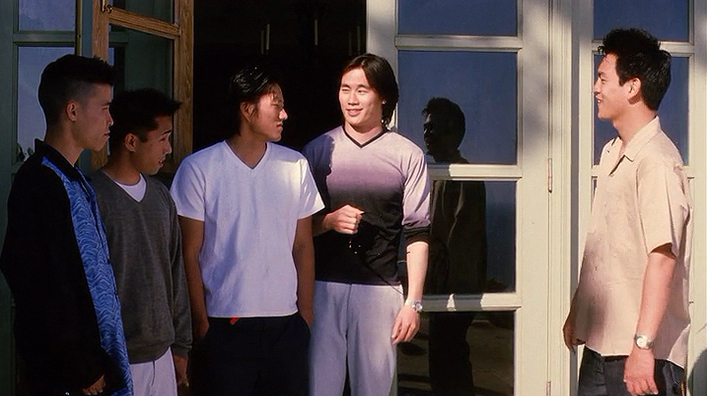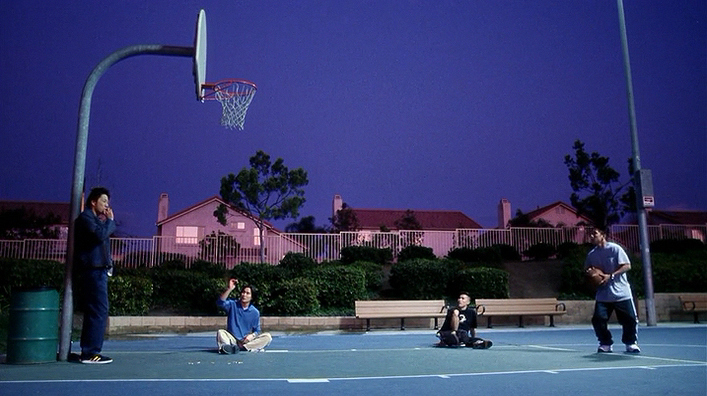To be frank with you, my high school life during the late 1990s was mostly kept on the straight and narrow. Every day and night during that intense period, I was constantly driven and pressured for getting higher test scores, which would be the important stepping-stones for going to a certain prestigious college where I eventually studied later during 2000s. As long as I gave results satisfying enough for me as well as my parents, I was totally free without any interference or supervision, and my mind could often go all the way for movies and books as getting less bored and pressured than usual.
While revisiting “Better Luck Tomorrow”, I noticed again some of myself from its Asian American high school characters. While their world is very different from mine in many aspects, these kids are as smart, competitive, and pressured as I was during my high school years, and I understand their ennui and suffocation to some degree, though I would not have even dreamed of committing those serious transgressions and misdemeanors at their age.
After the opening scene which gradually reveals something quite alarming, the first act of the movie establishes the mundane daily suburban life of Ben Manibag (Parry Shen), whose phlegmatic narration looks back on how things went very wrong for him and his friends. While being your average overachieving Asian American high school student, Ben has also participated in several extracurricular activities to decorate his resumé for college admission, and we observe how he busily juggles many other things to do besides doing homeworks and studying for upcoming exams. During one brief scene, the movie shows him doing a part-time job for earning some money, and he sardonically muses a bit on how easy it is for him to work there. All he has to do is remembering well the manuals for the employees, and he surely excels there just like he has always done at his school.
As a member of the school basketball team, Ben has been quite determined to be chosen for the upcoming season, and we see his punctilious efforts for honing his athletic skills. When he is included in the list of the members to play during the upcoming season, he feels some fulfillment, but then he only finds himself mostly stuck on the bench during the following games. When Daric Loo (Roger Fan), one of his Asian American schoolmates who is also the editor of the school newspaper, later tells him that he was selected just because of his race instead of his athletic skills, Ben is not so pleased at all, and Daric’s subsequent article on him makes him all the more frustrated and exasperated. Getting the sympathy and support from others just because of being a token Asian team player is the last thing he wants, and that eventually leads to his withdrawal from the team.

Not long after that, Daric approaches to Ben again, and he has an offer which may interest Ben. Daric wants Ben to join his cheat sheet operation, and Ben does not refuse Daric’s offer at all because, as already shown to us, he has often done petty criminal activities along with his best friend Virgil Hu (Jason Tobin) and Virgil’s cousin Han Lue (Sung Kang), who also soon join Daric’s criminal operation without any hesitation. They are all eager to go wild behind their supposedly exemplary appearance, and that exciting sense of power and freedom from their growing criminal enterprise is irresistible to them to say the least.
The movie is often disturbing and uncomfortable in its objective depiction of Ben and his accomplices’ casual amorality. They come to sell not only cheat sheets but also drugs in their high school, and they do not have any problem with that because they get much more money than before. When they later become quite notorious due to one reckless incident involved with a gun, they do not mind enjoying their infamy, though they are still immature boys nonetheless as shown from their momentary encounter with real street thugs.
Although it does not directly explain to us what exactly makes Ben and his friends tick, the screenplay by director/editor Justin Lin and his co-writers Ernesto Foronda and Fabian Marquez lets us gather it for ourselves little by little via mood and details. These kids do not seem to have any serious trouble at their affluent suburban homes, but they are simply bored and suffocated as frequently driven toward academic excellence, and escaping to any college prestigious enough for them still feels like a distant end point, even though they are not that far from graduation.
Steadily maintaining its detached attitude, the movie firmly sticks to these kids’ focused viewpoint while seldom looking outside. You may wonder what the hell their parents are doing, but their parents are virtually non-existent in the film, and the same thing can be said about most of those adult figures in their school. As long as they seem to be doing well on the surface, nobody particularly interferes with these kids, and we come to gather that is the main reason why they can get away with many misdeeds of theirs.
However, no matter how much they hurl themselves into their clandestine rebellion, Ben and his friends are still stuck in their suffocating environment, and he becomes more aware of the toll of his increasingly precarious lifestyle – especially after a serious sign which makes him reflect more on how relentlessly he has exhausted his body and mind. He surely had lots of fun from his small-time crimes, but he remains unhappy and discontent as before, and he is already pretty tired of being naughty behind his back (“It’s literally a full-time job just making people believe who you’re supposed to be,” he admits to us at one point).
In the meantime, Ben gets closer to a popular Asian girl named Stephanie Vandergosh (Karin Anna Cheung), who is also very interested in getting to know him more. As they come to spend more time with each other, Ben considers being more serious about her, but she has been dating Steve Choe (John Cho), a rich Asian kid who studies at a prestigious high school in their neighborhood. Probably because he cares more about himself than her, Steve lets his girlfriend attend a school event along with Ben instead of him, but he makes it quite clear to Ben that she is still his girlfriend, and Ben cannot help but feel inferior to Steve, though Steve turns out to have felt pretty unhappy and trapped just like him.
As announced to us from the start, the story becomes more disturbing during its eventual third act, where Ben and his accomplices face the devastating consequence of their latest criminal action. During that gut-wrenching moment, cinematographer Patrice Lucien’s camera swiftly swirls around the center for accentuating their panic and disorientation, and the resulting dramatic impact is palpable to say the least.
We accordingly become more distant to its main characters than before, but the movie keeps holding our attention via its considerable style and verisimilitude, and the overall result is all the more remarkable because the production budget was no more than $250,000. Lin and his production team really tried hard to secure that small production budget, and their production could have actually been aborted at one point if it had not been for MC Hammer, who liked Lin’s script enough to hand over $10,000 to Lin without any hesitation. As far as I can see, the movie does not feel old or shabby at all even though it was made almost 20 years ago, and I guess Lin and his crew members used their budget quite efficiently without wasting any of it.
Lin also stuck to his vision to the end – especially in case of the characters and the performers to play them. According to his New York Times interview in February 2016, there was a potential investor willing to provide one million dollar for the production, but Lin said no because that potential investor demanded that white performers should be cast instead of Asian ones, and he was right in his decision. The racial background of the main characters in the film is indeed crucial in making its story specific and distinctive, and the movie consequently comes to us as an interesting slice of Asian American life in addition to working well as a cautionary adolescent crime tale.
When it had a premiere at the Sundance Film Festival in early 2002, the movie naturally drew lots of attention. As some of you remember well, it also received the strong public approval of Roger Ebert, who passionately defended the film after one of the audiences asked a rather rude question to the filmmakers during the Q&A after the Sundance screening. Some people like that audience thought the movie was irresponsible in its negative portrayals of Asian Americans, but, as Ebert shrewdly pointed out, Asian American filmmakers should be as free as white American filmmakers in their choice of story and character. They are surely entitled to do whatever they want without any obligation to represent their people, and Lin simply exerts his artistic freedom here while also boldly confronting and then subverting Asian American stereotypes.
Although it took more than one year for the movie to get eventually released in US theaters, the modest but significant achievement of the movie boosted the careers of Lin and his main cast members, who have respectively led each own solid acting career since the movie came out. While Perry Shen’s earnest performance holds the center, Jason Tobin, Roger Fan, and Sung Kang embody well their characters’ vivid and colorful personalities, and John Cho, who later had another big career boost via “Harold & Kumar Go to White Castle” (2004), and Karin Anna Cheung are also engaging as two other substantial supporting characters in the story.
On the whole, “Better Luck Tomorrow” has held up its own place well among a number of other notable Asian American films ranging from “The Joy Luck Club” (1994) to “Minari” (2020), and it remains to be the pinnacle in Lin’s filmmaking career, which has been mainly associated with those Fast and Furious flicks. I will not deny that I was amused and entertained by some of his outputs in that humongous Hollywood blockbuster franchise, and I duly recognize that Lin has every right to do whatever he wants, but, folks, I cannot help but hope that he will make something as impressive as “Better Luck Tomorrow” someday.










